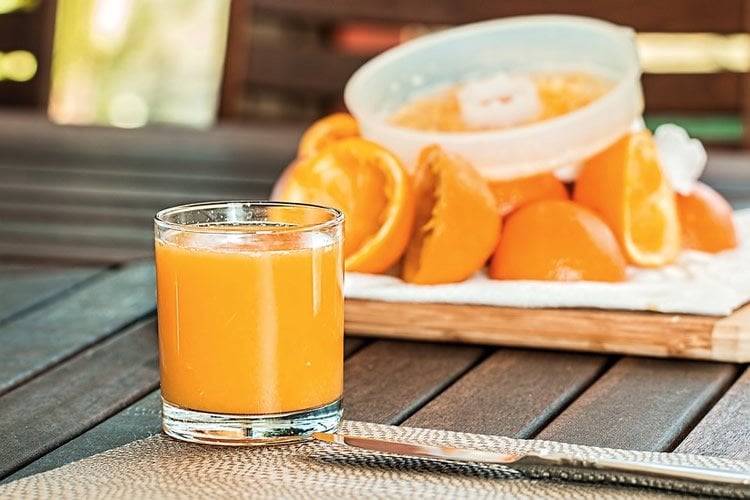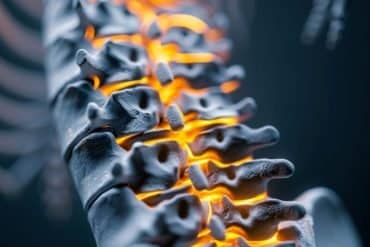Summary: Study reports 34% of men who consumed more leafy vegetables, and 47% who regularly drank orange juice were less likely to develop poor cognitive skills than those who did not.
Source: AAN.
Eating leafy greens, dark orange and red vegetables and berry fruits, and drinking orange juice may be associated with a lower risk of memory loss over time in men, according to a study published in the November 21, 2018, online issue of Neurology.
“One of the most important factors in this study is that we were able to research and track such a large group of men over a 20-year period of time, allowing for very telling results,” said study author Changzheng Yuan, ScD, of Harvard T.H. Chan School of Public Health in Boston. “Our studies provide further evidence dietary choices can be important to maintain your brain health.”
The study looked at 27,842 men with an average age of 51 who were all health professionals. Participants filled out questionnaires about how many servings of fruits, vegetables and other foods they had each day at the beginning of the study and then every four years for 20 years. A serving of fruit is considered one cup of fruit or ½ cup of fruit juice. A serving of vegetables is considered one cup of raw vegetables or two cups of leafy greens.
Participants also took subjective tests of their thinking and memory skills at least four years before the end of the study, when they were an average age of 73. The test is designed to detect changes that people can notice in how well they are remembering things before those changes would be detected by objective cognitive tests. Changes in memory reported by the participants would be considered precursors to mild cognitive impairment. The six questions include “Do you have more trouble than usual remembering a short list of items, such as a shopping list?” and “Do you have more trouble than usual following a group conversation or a plot in a TV program due to your memory?”
A total of 55 percent of the participants had good thinking and memory skills, 38 percent had moderate skills, and 7 percent had poor thinking and memory skills.
The participants were divided into five groups based on their fruit and vegetable consumption. For vegetables, the highest group ate about six servings per day, compared to about two servings for the lowest group. For fruits, the top group ate about three servings per day, compared to half a serving for the bottom group.
The men who consumed the most vegetables were 34 percent less likely to develop poor thinking skills than the men who consumed the least amount of vegetables. A total of 6.6 percent of men in the top group developed poor cognitive function, compared to 7.9 percent of men in the bottom group.
The men who drank orange juice every day were 47 percent less likely to develop poor thinking skills than the men who drank less than one serving per month. This association was mainly observed for regular consumption of orange juice among the oldest men. A total of 6.9 percent of men who drank orange juice every day developed poor cognitive function, compared to 8.4 percent of men who drank orange juice less than once a month. This difference in risk was adjusted for age but not adjusted for other factors related to reported changes in memory.
The men who ate the most fruit each day were less likely to develop poor thinking skills, but that association was weakened after researchers adjusted for other dietary factors that could affect the results, such as consumption of vegetables, fruit juice, refined grains, legumes and dairy products.

The researchers also found that people who ate larger amounts of fruits and vegetables 20 years earlier were less likely to develop thinking and memory problems, whether or not they kept eating larger amounts of fruits and vegetables about six years before the memory test.
The study does not show that eating fruits and vegetables and drinking orange juice reduces memory loss; it only shows a relationship between them.
A limitation of the study was that participants’ memory and thinking skills were not tested at the beginning of the study to see how they changed over the course of the study. However, because all participants completed professional training, they can be assumed to have started with relatively high cognitive function in early adult life. In addition, the study participants were all male health professionals such as dentists, optometrists, and veterinarians. Thus, the results may not apply to women and other groups of men.
Funding: The study was supported by a grant from the National Institutes of Health and an anonymous gift to the Harvard T.H. Chan School of Public Health.
Source: Renee Tessman – AAN
Publisher: Organized by NeuroscienceNews.com.
Image Source: NeuroscienceNews.com image is in the public domain.
Original Research: Abstract for “Long-term intake of vegetables and fruits and subjective cognitive function in US men” by Changzheng Yuan, Elinor Fondell, Ambika Bhushan, Alberto Ascherio, Olivia I. Okereke, Francine Grodstein, and Walter C. Willett in Neurology. Published November 21 2018.
doi:10.1212/WNL.0000000000006684
[cbtabs][cbtab title=”MLA”]AAN”Orange Juice, Leafy Greens and Berries Tied to Decreased Memory Loss in Men.” NeuroscienceNews. NeuroscienceNews, 23 November 2018.
<https://neurosciencenews.com/diet-men-memory-10246/>.[/cbtab][cbtab title=”APA”]AAN(2018, November 23). Orange Juice, Leafy Greens and Berries Tied to Decreased Memory Loss in Men. NeuroscienceNews. Retrieved November 23, 2018 from https://neurosciencenews.com/diet-men-memory-10246/[/cbtab][cbtab title=”Chicago”]AAN”Orange Juice, Leafy Greens and Berries Tied to Decreased Memory Loss in Men.” https://neurosciencenews.com/diet-men-memory-10246/ (accessed November 23, 2018).[/cbtab][/cbtabs]
Abstract
Long-term intake of vegetables and fruits and subjective cognitive function in US men
Objective
To evaluate the prospective association of long-term intake of vegetables and fruits with late-life subjective cognitive function (SCF).
Methods
Among 27,842 men with a mean age of 51 years in 1986, we used multinomial logistic regression to examine the relation of vegetable and fruit consumption to future SCF. Average dietary intake was calculated from 5 repeated food frequency questionnaires collected every 4 years until 2002. SCF score was assessed twice (2008 and 2012) using a 6-item questionnaire; validity was supported by strong associations with APO ε4 genotype. We categorized the average of the 2 scores as good, moderate, and poor SCF.
Results
Higher intakes of total vegetables, total fruits, and fruit juice were each significantly associated with lower odds of moderate or poor SCF after controlling for major nondietary factors and total energy intake. The association with total fruit intake was weaker after further adjusting for major dietary factors. In this model, the multivariate odds ratios (95% confidence intervals) for vegetable intake (top vs bottom quintile) were 0.83 (0.76–0.92), p trend <0.001 for moderate SCF and 0.66 (0.55–0.80), p trend <0.001 for poor SCF. For orange juice, compared to <1 serving/mo of intake, daily consumption was associated with a substantially lower odds of poor SCF (0.53 [0.43–0.67], p trend <0.001). Higher consumption of vegetables and fruits 18 to 22 years before SCF assessment was associated with lower odds of poor SCF independent of more proximal intake.
Conclusion
Our findings support a long-term beneficial role of vegetable, fruit, and orange juice consumption on SCF.






